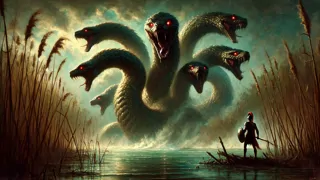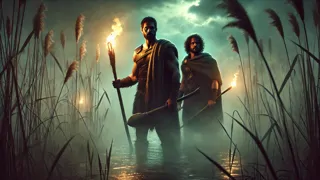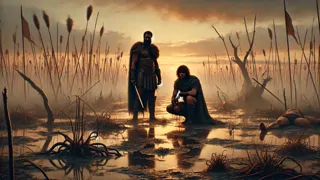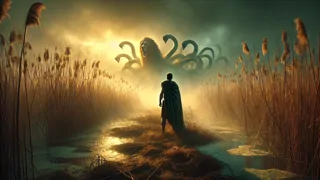Introduction
In the heart of ancient Argolis, beneath the unblinking gaze of distant mountain peaks, the marshes of Lerna spread like a living shadow across the land. The air was thick with secrets, whispers of old gods and heroes drifting among reeds and stagnant pools. To the villagers living at the marsh’s edge, Lerna was a place of both awe and terror—a liminal space where the world of mortals brushed against the realms of myth. In these primeval waters, beneath tangled willows and the perpetual shroud of mist, a legend had taken root: the Lernaean Hydra, a monstrous serpent of such deadly power that even the bravest hunters dared not tread near its lair. It was here, in this haunted domain, that Heracles, son of Zeus and Alcmena, was summoned to perform his second labor—a task not for glory or gold, but to atone for a past that weighed heavy on his immortal heart. The gods watched in silence as Heracles approached, each step a testament to the unyielding resolve that would one day carve his name into the bedrock of legend. Armed with nothing but his wits, a lion’s skin, and the crude weapons of man, he prepared to face a creature whose very breath could poison the world. The marsh quivered in anticipation, reeds bending to the will of an ancient destiny, as the greatest hero of Greece prepared to do battle not only with the Hydra, but with the darkness that dwells within us all.
The Marshes of Lerna: Shadows and Omens
The journey to Lerna began beneath a vault of pale morning sky. Heracles’ feet were sore from miles of rough earth, his hands still bearing the calluses from his first labor—the slaying of the Nemean Lion. The pelt of that beast hung over his broad shoulders now, its golden fur battered but still impervious, a trophy that had already become a part of his legend. Yet, as he neared the marsh, he felt a new weight settle over him: the gravity of this task, whispered by the very land itself.

Lerna was no ordinary swamp. For generations, it had been a place where travelers vanished without a trace and cattle wandered in only to return with madness in their eyes. The villagers spoke in hushed voices of unnatural fogs and shapes that moved with purpose beneath the water’s surface. It was said that Hades himself had once opened a gate here, allowing the dead to rise and mingle with the living. But the most dreadful tale was that of the Hydra—a creature birthed by the monstrous Typhon and Echidna, designed as a curse upon mortals and gods alike.
This was not a serpent as mortals knew them. The Hydra’s body was vast, coiling through the marsh like a living river, armored in scales that glimmered with the sickly sheen of old bronze. Nine heads—some said more—swayed from its shoulders, each one venomous, each with jaws capable of crushing bone. Worse yet, its greatest terror was reserved for those who dared to harm it: for every head that was severed, two more would spring forth, hydra-like, from the bleeding stump. Its breath wilted plants, its blood tainted the earth. It was death incarnate, a challenge only the gods would dare lay before a hero.
Heracles paused at the water’s edge, feeling the muck pull at his sandals. His companion, the loyal nephew Iolaus, trailed behind, uncertain but resolute. They had come armed with torches, swords, and the knowledge that brute force alone would not win this battle. As the sun rose higher, a hush fell over the land, broken only by the distant croak of frogs and the buzz of insects—a deceptive calm masking the violence coiled beneath.
Ancient oaks loomed overhead, their roots half-submerged in black water. Heracles scanned the shadows for movement. The marsh seemed to breathe around him, each gust of wind hinting at the Hydra’s presence. The villagers had warned him of its lair: a tangled mound of reeds and stone where the creature slept by day, emerging only when darkness cloaked the land. Yet there was no sense in waiting for nightfall. Heracles had faced death before and survived; now, he would face death multiplied.
Iolaus shivered as he stepped closer. “Uncle, do you truly believe you can kill such a thing?”
Heracles gripped his club—a length of olive wood hard as iron, stained with the blood of monsters. “If I falter now, the Hydra will haunt these lands forever. We end this today.”
They pressed deeper into the marsh, following a trail of crushed reeds and fetid water. The air grew thick with an unholy stench, so potent it made their eyes water. Soon, the world seemed to close in—a labyrinth of mud and tangled roots, every step a reminder of the danger that surrounded them. Insects swarmed, their wings humming a nervous dirge. Heracles kept his senses sharp, searching for the first sign of his quarry.
Suddenly, a ripple shivered across the water. From beneath a bank of mud, a head emerged—then another, and another, until the Hydra revealed itself in all its grotesque glory. Its eyes blazed like coals, tongues flicking in anticipation. The hero’s breath caught in his throat. Even for him, this was a terror beyond measure.
The Battle of Blades and Fire
The Hydra lunged with the speed of a striking viper, its nine heads hissing in unison. Heracles barely had time to brace himself before the first set of jaws snapped inches from his face. He swung his club in a wide arc, shattering teeth and sending one head flying into the mire. For a heartbeat, triumph surged in his chest—until he saw two new heads writhing from the bleeding stump. The monster seemed to swell with power, fueled by its own wounds.

Iolaus cried out, torch raised high, as another head snaked toward him. The flames licked at the Hydra’s scales, forcing it to recoil for a moment. Heracles seized the opportunity, leaping atop a slick stone and swinging again. The club landed with thunderous force, splintering another head. Blood hissed where it struck the earth, burning holes in the mud and releasing noxious fumes. The air turned sour, thick with the stench of death and venom.
But the Hydra was not so easily defeated. It lashed its tails, sending waves crashing through the marsh. Mud and water sprayed as Heracles fought to keep his footing. Each time he severed a head, more grew in its place—until the beast seemed to possess a dozen, then fifteen, writhing and snapping from its monstrous shoulders.
Sweat poured down Heracles’ brow as he realized the futility of brute strength. His arms ached, but he refused to yield. Iolaus darted to his side, his torch blazing. “Uncle! We must stop the heads from growing back!”
Heracles remembered the wisdom of his old tutor, Chiron: sometimes, to overcome a monster, one must use wit as well as might. He shouted to Iolaus, “When I strike off a head, burn the wound!”
With grim determination, Heracles redoubled his attack. He smashed another head from the Hydra’s body. Before the stumps could sprout anew, Iolaus pressed the torch to the bleeding wound. Flesh sizzled, filling the air with the smell of charred meat. For the first time, a head did not regrow.
Encouraged, they pressed their advantage. Heracles struck, Iolaus burned. Head by head, they reduced the Hydra’s numbers, ignoring its frenzied howls and poisonous spittle. The monster thrashed, trying to drag them into the swamp’s depths. Water churned as its tails battered the ground, uprooting trees and sending waves lapping against distant shorelines.
At last, only one head remained—the immortal head, said to be impervious to blade or fire. Its eyes glowed with ancient malice, and its jaws snapped with fury. Heracles lunged, wrestling the Hydra’s neck with all his might. With a roar that shook the marsh, he drove his sword into the creature’s throat, pinning it to the earth. The Hydra writhed, its body convulsing in death throes, but it could not escape.
With Iolaus’ help, Heracles severed the immortal head and buried it beneath a massive boulder, ensuring it would never rise again. The marsh fell silent, the spell of fear broken at last. But as Heracles gathered a vial of the Hydra’s poisonous blood—a trophy for future labors—he knew that this victory had come at a heavy cost. The land itself would bear the scars of their battle for generations.
Aftermath and Immortal Echoes
The marsh of Lerna lay transformed by battle. Where once reeds swayed undisturbed, now trampled paths snaked through blackened mud and pools tainted by the Hydra’s venomous blood. The air still vibrated with the memory of roars and the crackle of torches. Heracles stood amid the wreckage, breathing hard, his lion’s pelt scorched and splattered. Iolaus leaned on his torch, gaze distant, both men marked forever by what they had faced.

Victory did not come with jubilation. Instead, there was a quiet reverence—a sense that something ancient had been shifted, perhaps even angered, by their intrusion. As Heracles surveyed the ruined lair, he found himself reflecting on what it meant to be a hero. Slaying monsters was never just a matter of muscle or weaponry; it was an ordeal of spirit, a trial that revealed both strengths and flaws. The Hydra had tested not only his courage but his ingenuity, and it was only through the trust and quick thinking of Iolaus that triumph was possible.
Heracles knelt by the spot where the immortal head lay buried. He whispered an oath to the gods, thanking them for guidance and swearing to use the Hydra’s venom with wisdom. The lesson was not lost on him: every victory comes with unforeseen consequences, every monster slain leaves traces in the world and in the soul. The marsh would heal in time, but scars—both seen and unseen—would linger.
The villagers returned cautiously, watching from afar as Heracles and Iolaus emerged from the mist. Word spread quickly through Argolis and beyond: the Hydra was dead. People rejoiced, yet they also honored the fallen land, offering prayers at the edge of Lerna’s waters and leaving tokens for the restless spirits said to dwell there.
Heracles’ legend grew. Songs were sung of his battle with the multi-headed beast, but only those who truly listened understood the heart of the tale. It was a story about more than monsters; it was about facing what seems insurmountable, about accepting help when pride falters, and about carrying forward even when victory tastes bitter. In time, Heracles would move on to new labors—each with its own terrors and lessons—but the memory of Lerna would haunt him forever, a reminder that even heroes are shaped as much by their wounds as by their triumphs.
Conclusion
The tale of Heracles and the Lernaean Hydra endures not just as a chronicle of heroism, but as a mirror held up to every generation that faces impossible odds. The story’s power lies in its complexity: Heracles is not a flawless conqueror, but a man who overcomes despair through persistence, cleverness, and trust in those who stand beside him. The Hydra, with its ever-multiplying heads, becomes a symbol for life’s relentless challenges—adversity that grows stronger with every blow. Yet, with each hardship faced head-on, with each lesson learned through struggle, victory becomes not just possible, but transformative. The marshes of Lerna may eventually return to peace, reeds once again swaying above still water, but the echoes of Heracles’ labor linger in every telling. They remind us that courage is not the absence of fear or failure—it is the stubborn will to act, to adapt, and to endure, no matter how monstrous the darkness may appear.


















